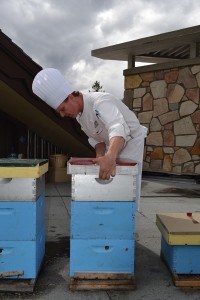
Paul Shewchuk grunts as he lifts the lid off of a beehive atop the roof of the Fairmont Jasper Park Lodge, Aug. 29. He’s the executive chef at the hotel, and is dressed for the part in chef’s whites and a tall, straight toque. Beekeeper’s clothing is noticeably absent.
A faint hum buzzes from the row of hives on the roof, and a few bees lope through the air. The question is raised whether he often gets stung.
“Yup,” he says, still grunting under the weight of the hive section, “it might happen right now.” As the hive splits open, the buzzing sound intensifies and dozens of bees swarm out, weaving chaotically through the air.
“You start swatting at the air and they will come at you,” he says. “Once you’re stung the other bees will kind of become attracted to that, and then they’ll start stinging you. You’re better off not getting stung.”
With that advice, he sets down the hive and crouches down for a closer inspection. The one he split open consists of four wooden boxes, each about the size of a filing cabinet drawer, stacked on top of one another. Inside each box eight or nine “frames” are slotted in a few centimeters apart, each crawling with bees.
He explains that each hive holds up to 15,000 bees, which means close to 100,000 of the insects live in the six hives on the hotel’s roof. Shewchuck wears no bee suit because the bees seem calm today, and anyway, they are domesticated European Honey Bees—a particularly docile breed.
“I come up here two or three times a week to look into the hives and take them apart, just to make sure they’re doing OK. Other than that the bees are pretty self-sufficient. They go out and do all the work; bring back the honey, put it in the hive,” says Shewchuck.
Three years ago Fairmont’s former executive chef started a bee colony of four hives on the roof, with the intention of harvesting the honey to use in the restaurant. Shewchuck has since taken over care of the hives, which now number six and produce about 250 pounds of honey each year.
Shewchuck explains that his team harvests that honey directly from the hive and uses it in its menu. The sticky treat appears in everything from the brazed pork belly to the sautéed vegetables.
To harvest it, the chefs—aided by an out-of-town beekeeper—split open each hive, scrape the honey out of the combs and put it in a centrifuge downstairs in the kitchen. The whole process takes about six hours.
Along with putting it into the menu, Shewchuck also bottles some of the honey to give away to guests, and even sends some to Big Rock Brewery in Calgary to have it turned into beer.
Part-time beekeeper has been an interesting addition to his job description, and having a colony of bees has proven both challenging and fun for the chefs at the Fairmont. Gesturing to the set of patio furniture sitting a few feet away, Shewchuck explains how the place has become a kind of “think tank” for him and his chefs.
“This is our getaway, so we come up and hang out with the bees and kind of plan our days. They’re fun, they’re like cool little pets,” he says.
And while fun in one sense, the bees also present their share of problems. Shewchuck still remembers the first time a large swarm formed.
When a queen bee leaves its nest, the rest of the colony follows her pheromone scent, causing a huge swarm to follow her. One day just such a thing happened in one of the hives, resulting in tens of thousands of bees taking up residence in one of the hotel’s pine trees.
To disperse the swarm they had to get into full bee suits and reach directly into the middle of the swarm to try and nab the queen to bring her back to the nest.
But Shewchuck remembers the incident with a smile. The past three years have given him an appreciation for the insects and what they are able to accomplish.
“It’s just an interesting process to see the bees and what they can do. I didn’t realize how in unison they actually were.
“To put it in perspective, you’ve got 15,000 bees all working for one job, one process all in harmony in there in a box that’s a foot and a half wide by two feet deep. If I put 15,000 people in this hotel and ask them to do one job we’d have chaos down there.”
He nods slowly, takes one last look at the bees teaming inside the hive, and closes it up, before walking back to the relative chaos of his kitchen.
Trevor Nichols
[email protected]
